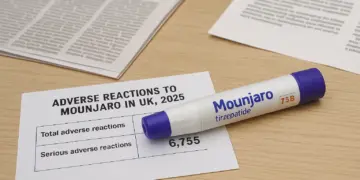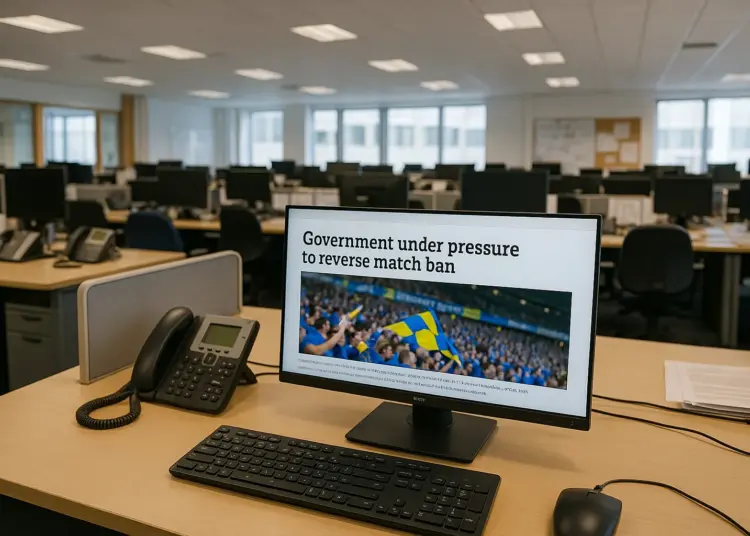Story Highlight
– Maccabi Tel Aviv fans banned from Aston Villa fixture.
– Birmingham’s Safety Advisory Group deemed event “high-risk.”
– Government officials convened after criticism of the ban.
– Keir Starmer and others call for reversal of decision.
– Government exploring options for ensuring fan attendance.
Full Story
In a recent turn of events, discussions within government circles have intensified following the controversial decision to prohibit Maccabi Tel Aviv supporters from attending an upcoming fixture against Aston Villa. The decision, announced late yesterday, sparked significant backlash from various political figures and stakeholders.
The Birmingham Safety Advisory Group (SAG) made the pivotal decision based on an assessment conducted by West Midlands Police. The police classified the match as “high-risk,” citing concerns over potential violence and disturbances. This classification takes into consideration intelligence gathered from recent occurrences, notably violent encounters during a UEFA Europa League match held in Amsterdam earlier this year.
Following the announcement, both the SAG and the local council indicated that they would be prepared to revisit their decision should there be a reassessment of the risks involved. However, these measures have not quelled the growing calls for intervention at the governmental level.
Reports indicate that the Home Office was made aware of the potential for such a ban last week, though officials claim they were not informed of the final verdict until it was publicly revealed. Political leaders from across the spectrum have expressed disapproval. Keir Starmer, leader of the Labour Party, articulated his discontent, stating he is “angered” by the decision and pledging to take all necessary steps to reverse the ban. Meanwhile, Kemi Badenoch, a prominent member of the Conservative Party, described the move as a “national disgrace,” while Ed Davey, leader of the Liberal Democrats, echoed sentiments for an instant reversal of the decision.
Despite widespread criticism, the legal avenues available to the government appear limited, as the ultimate authority for such decisions rests with the local council and the SAG. A spokesperson for the government addressed the matter, asserting, “No one should be stopped from watching a football game simply because of who they are.” The statement reaffirmed the government’s commitment to collaborating with law enforcement and relevant agencies to facilitate a safe environment for the match, emphasizing an intention to explore what additional resources and support may be needed.
As the situation develops, the potential implications for future fixtures and the broader context of fan safety and engagement in football will remain in focus. Stakeholders are keenly aware of the sensitivities surrounding supporter attendance, particularly in light of prior incidents that have raised safety concerns at sporting events.
The use of risk assessments in informing decisions regarding supporter attendance illustrates the ongoing tensions between ensuring public safety and maintaining an inclusive sporting environment. With mounting pressure from various political figures and fan advocacy groups, the local authorities may find themselves reassessing their approach in the days leading up to the match.
The complexity of balancing fan attendance with safety measures may set the stage for further discussions not only within Birmingham but throughout the UK football landscape. Stakeholders will be paying close attention to how this situation unfolds and what precedents may be established regarding supporter inclusivity and safety protocols in the sport.
As the debate continues, those engaged in football will look for reassurances that safety measures are being adequately integrated without compromising the spirit of the game. Enthusiasts and commentators alike are keen to see a resolution that honours both the right to enjoy the sport and the imperative to keep all participants safe.
This evolving scenario shines a light on the broader issues faced by sport as it seeks to navigate the complexities inherent in fostering safety and inclusivity within the vibrant community of football supporters.























Safety must come first. Any decision about allowing supporters to travel or attend matches should be based on clear, evidence based risk assessments and not political pressure. If the local safety advisory group has designated the fixture as high risk they should publish the rationale and mitigation measures considered so everyone can see the assessments were thorough and proportionate. At the same time authorities should look for ways to reduce risk through practical measures such as segregated transport, controlled arrival times, enhanced stewarding and policing plans and liaison with fan groups so legitimate supporters are not unfairly excluded. Transparency and communication will be key to maintaining public confidence and ensuring decisions are seen as focused on protecting everyone at the event.
Safety of all supporters must come first, but decisions should be evidence based, proportionate and regularly reviewed. Blanket bans can alienate fans and damage community trust, so any restrictions should be accompanied by clear reasons, transparent risk assessments and a plan to mitigate issues through stewarding, liaison with clubs and travel arrangements. Where intelligence indicates real risk, temporary controls may be necessary, but they should be the least restrictive option and include routes for appeal and monitoring so they can be lifted as soon as it is safe to do so.
Safety must be based on clear, evidence led risk assessments and open dialogue with supporters and clubs. Blanket bans can undermine trust and fuel tensions if alternatives are not explored. Local authorities should publish the data and criteria behind the decision, outline mitigations considered and engage with fan groups and the clubs to seek proportionate measures that protect public safety while avoiding unnecessary exclusion.